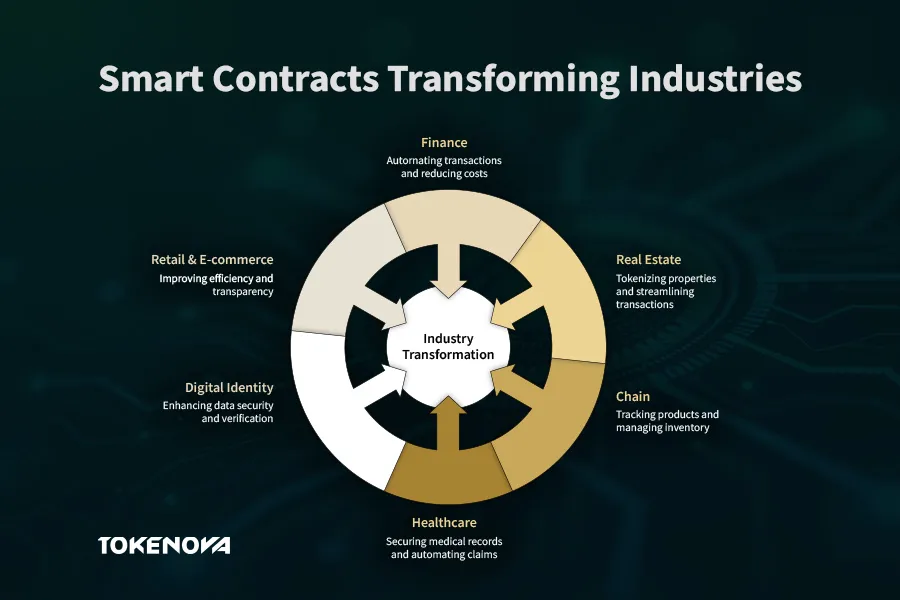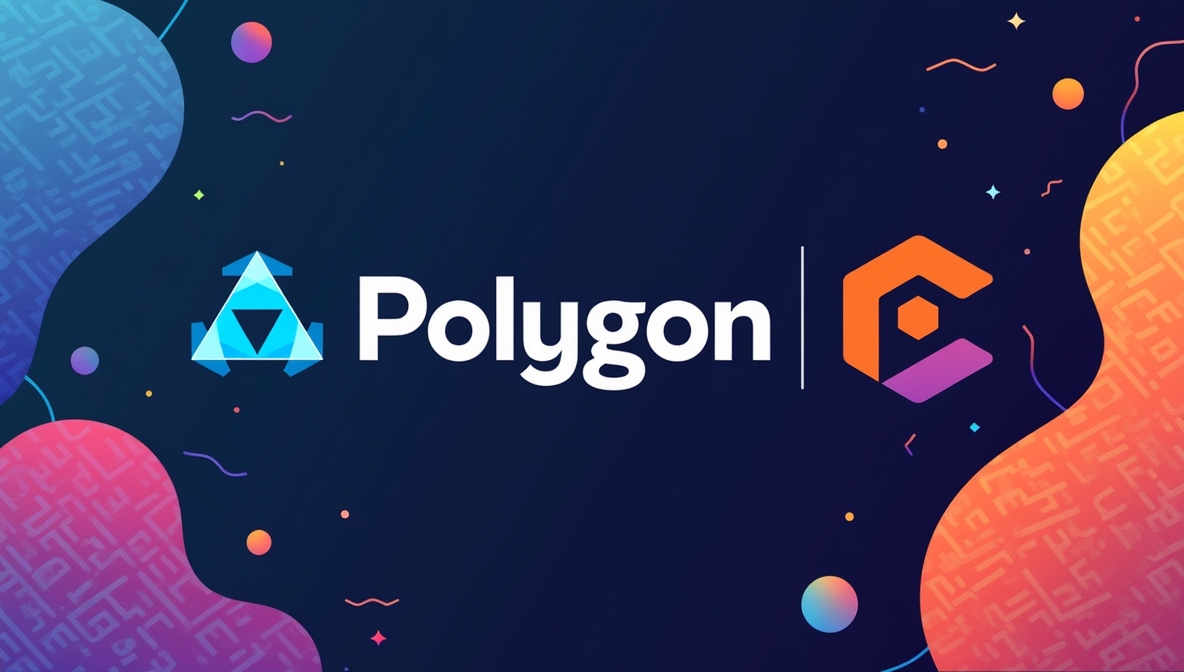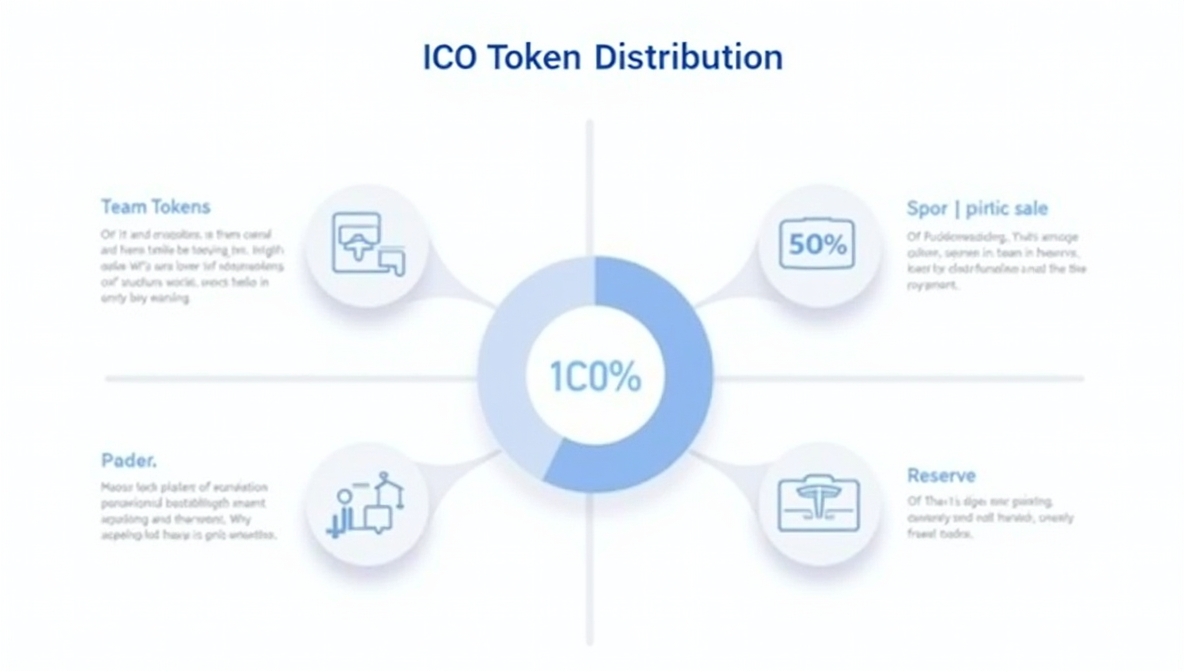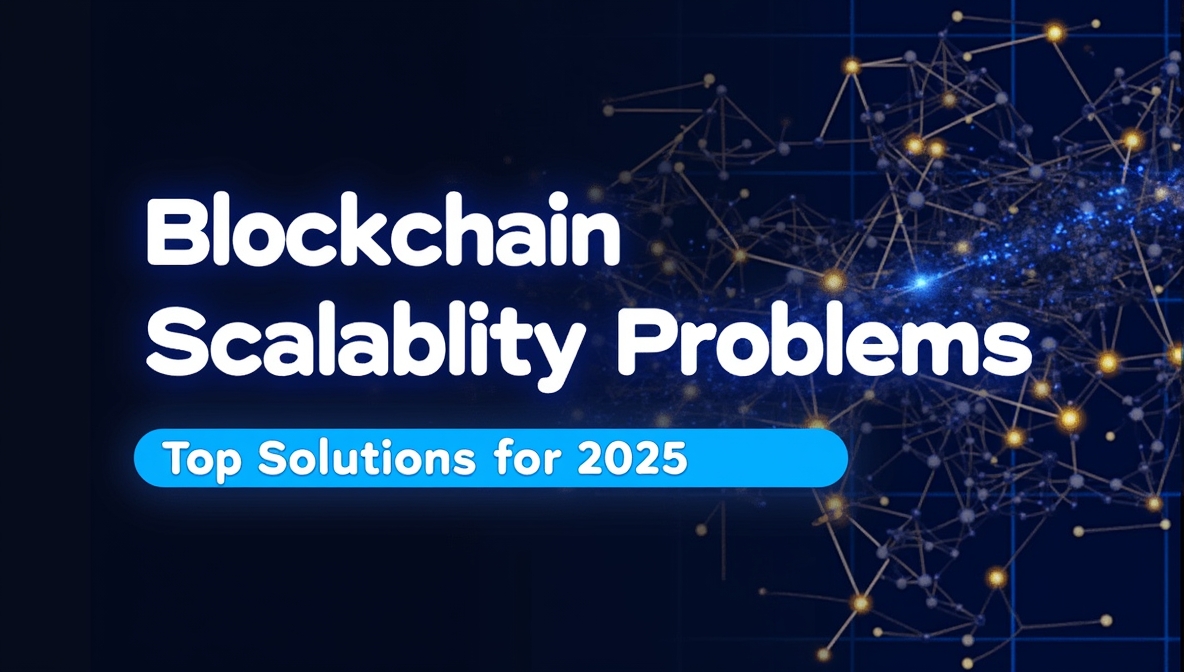Did you know that by 2024, the total value locked in decentralized finance (DeFi) smart contracts reached $94.9 billion, marking 75.1% annual growth in the ecosystem? By automating procedures and improving efficiency, this remarkable expansion emphasizes the transforming power of smart contracts in changing several sectors. Understanding how blockchain project concepts and smart contracts are transforming industries, including finance, real estate, and supply chain management, as we explore their realm can help one grasp. Stored on blockchain development systems, these digital programs are not only a technology trend but also a key driver of innovation and openness.
Smart contracts are enabling innovative applications, ranging from automated escrow services that streamline property transfers to decentralized exchanges that eliminate the need for traditional institutions. Across several sectors, they are greatly improving transaction speed and lowering expenses. Smart contracts are creating new possibilities in sectors including healthcare, entertainment, and energy by encouraging openness, building trust, and allowing direct interactions among several players. These developments guaranteeare guaranteeing strong information security and enhanceenhancing operational efficiency.
As you continue reading this article, you will see how several sectors are using smart contracts to generate creative ideas. The uses are many and important, from improving supply chain insight to automating insurance claims. Explore blockchain project concepts to discover how smart contracts are changing the future of digital transactions and corporate processes.
Innovative Smart Contract Projects in Finance

Smart contracts are spearheading innovation in the financial sector, representing some of the most promising smart contract project ideas . These self-executing agreements are transforming financial transactions by automating processes, reducing costs, and increasing efficiency through blockchain development advancements.
From decentralized exchanges to automated escrow services and syndicated loan management, let’s explore some of the most exciting blockchain project ideas in finance that leverage blockchain technology to revolutionize traditional systems.
Decentralized Finance (DeFi) Platforms
Decentralized exchanges are revolutionizing the way we think about banking and financial services. Platforms like AAVE provide peer-to-peer lending and borrowing services without intermediaries through blockchain development innovations. Smart contracts automatically execute loan terms and repayments, offering users a seamless and efficient experience while minimizing human mistakes.
The primary purpose of these decentralized applications is to facilitate direct transactions between multiple parties without traditional financial institutions. Such an approach not only reduces transaction fees but also increases transaction speed and information security. In 2024, the total value locked (TVL) in DeFi platforms reached $214 billion, showcasing the potential of this blockchain technology.
Ethereum remains a leading network for blockchain projects, hosting thousands of DeFi protocols and securing approximately $120 billion in value by late 2024. Smart contracts also manage reputational data, enabling reliable credit scoring systems that demonstrate the technical abilities required for modern risk assessment.
Automated Escrow Services
Blockchain-based smart contracts serve as automated escrow agents, securely holding proof of funds in digital form until all contractual conditions are met. This blockchain technology guarantees that all parties involved in a transaction can rely on the release of funds only upon the fulfillment of predefined terms. The automatically executed release mechanism enhances both security and efficiency compared to traditional escrow services.
Implementing smart contracts for escrow management dramatically reduces both transaction times and administrative overhead. These efficiencies prove particularly valuable in the mortgage industry, where conventional escrow processes often involve lengthy timelines and high costs. By leveraging blockchain technology, the entire escrow workflow becomes streamlined while maintaining robust cybersecurity protections.
Syndicated Loans Management
Syndicated loans, which typically involve multiple parties as lenders, present significant management complexities. Blockchain development solutions using smart contracts dramatically streamline these financial instruments by automating tasks related to compliance and administrative workflows. In 2024, over $125 billion in syndicated loans utilized this blockchain technology, demonstrating its growing adoption in financial blockchain project ideas.
The implementation of smart contracts in loan syndication provides two key advantages: guaranteed compliance with regulatory requirements and substantial reduction of errors. By leveraging blockchain technology, financial institutions can execute these complex transactions with greater efficiency while maintaining rigorous data privacy standards.
Transforming Real Estate with Smart Contracts

The real estate sector is experiencing a digital transformation, thanks to smart contract technology that facilitates property ownership . From tokenization of property to automated property transactions and blockchain-based land registry systems, smart contracts are making estate transactions more efficient, transparent, and accessible.
Let’s explore how these innovations are reshaping the industry.
Tokenization of Real Estate
Tokenization enables property assets to be converted into digital form, creating fractional ownership opportunities and expanding global investment potential. This blockchain development innovation divides high-value properties into smaller, tradable units through decentralized applications, democratizing access to land markets. Platforms like Propy utilize smart contracts to facilitate these transactions, tokenizing assets to let investors purchase fractions of properties worldwide while minimizing administrative overhead.
Smart contracts automatically execute critical components of tokenization, including:
- Digital token issuance
- Regulatory compliance verification
- Transaction validation
This blockchain technology ensures adherence to financial regulations while reducing human error—boosting both efficiency and investor confidence through transparent, tamper-proof recordkeeping.
The fractional ownership model represents a transformative shift in property investment, particularly for:
- Retail investors gaining access to premium markets
- Enhanced portfolio diversification options
- Streamlined cross-border transactions
By leveraging blockchain technology, tokenization breaks down traditional barriers to entry, creating new wealth-building opportunities while maintaining robust data encryption standards throughout the investment lifecycle.
Read More: What Assets Can Be Tokenized?
Automated Property Transactions
In 2023, Dubai’s Land Department facilitated a blockchain-based property transaction, enabling the sale of a property without intermediaries and, leveraging smart contracts to streamline the process. This initiative is part of Dubai’s broader push to integrate blockchain technology into the real estate sector for greater efficiency and transparency.
This real-world example demonstrates how blockchain technology enhances both efficiency and data integrity in property deals. The platform’s instantaneous verification of conditions through automatically executed contracts accelerated the closing process by up to 70% compared to traditional methods—a significant improvement across global property markets.
These decentralized applications provide three key advantages:
- Automatically executed agreements that increase reliability
- Elimination of intermediaries, reducing costs and administrative overhead
- Tamper-proof documentation on the blockchain development framework
By leveraging blockchain technology, the Dubai case study proves how smart contracts:
- Create transparent property investment opportunities
- Generate immutable, auditable records
- Maintain robust network security protocols
- Minimize human mistakes in transaction processing
This implementation showcases practical applications of blockchain project ideas in high-value asset transfers, where speed and security are paramount. The permanent, verifiable nature of blockchain records establishes new standards for trust in property transactions while demonstrating the technical abilities required for large-scale adoption.
Read More: Ultimate Guide to Smart Contract Security
Blockchain-Based Land Registry Systems
Sweden’s Lantmäteriet has been testing a blockchain-based system for land registries since 2016, successfully demonstrating secure property transactions in pilot phases, proving its potential for precise ownership records. By 2024, these trials, supported by ChromaWay, continued to advance, though full-scale adoption was still in progress.
Key benefits of this blockchain development initiative include:
- Unmatched Data Protection: The system’s architecture prevents unauthorized alterations through advanced data privacy measures
- Transparent Processes: Automatically executed smart contracts create permanent, auditable records
The implementation demonstrates practical applications of blockchain project ideas in government systems, where:
- All documentation remains tamper-proof
- Multiple parties can verify records in real-time
- Error is minimized through predefined validation protocols
Revolutionizing Supply Chain Management

Supply chain management is another critical area where smart contracts are making a profound impact. By ensuring complete product traceability, automating routine tasks like payments, and eliminating the need for daily manual oversight or auditing, these digital programs stored on blockchains are fundamentally transforming how global supply chains operate.
Let’s examine in detail the specific ways smart contract development is innovating chain management systems worldwide.
Real-Time Tracking and Verification
Smart contracts enable comprehensive real-time tracking of products throughout the entire supply chain ecosystem. This feature provides unprecedented visibility and accountability to all stakeholders involved. By automatically executing updates to supply chain databases, these contracts ensure all parties receive accurate, timely information — significantly reducing errors and operational delays.
The advanced tracking capabilities powered by blockchain technology extend beyond goods to payroll administration systems. For instance, smart contracts can precisely track employee work hours and automatically execute payments, dramatically improving accuracy and efficiency in compensation processing. This innovation reduces transaction speed for payments while enabling faster financial operations enterprise-wide.
Supply Chain Finance
Traditional supply chain finance (SCF) methods are slow, tedious, and plagued with excessive paperwork, which can cause bottlenecks and inefficiencies. This is where blockchain technology comes to the rescue, as it is revolutionizing this domain by suddenly creating a framework of transactions that travel at the speed of the internet along with infusing trust at the very heart of it. This enhances the traditional SCF processes by minimising the bottlenecks faced here such as manual transactions and enforcing compliance with preset rules throughout the supply chain finance process.
Blockchain technology will help companies improve the time-consuming process of supply chain finance. Moreover, blockchain helps reduce administrative overheads and promotes data integrity by eliminating the need for multiple approvals and minimizes the dependence on paper-based documentation. This creates a more trustworthy supply chain management system, which provides more visibility between each party involved. Blockchain technology has the potential to improve the overall flow of financial resources within the supply chain by increasing information transparency and traceability across all parts of the supply chain.
Inventory Management
Smart contracts revolutionize inventory control by automatically executing reorders when stock levels fall below predetermined thresholds. This ensures consistent product availability while
- Removing dependence on manual intervention
- Virtually eliminating stockout risks
- Optimizing warehouse management costs
Through real-time inventory monitoring enabled by blockchain development, these systems minimize discrepancies in stock records and accelerate order fulfillment cycles. Retailers leveraging this technology can assign unique digital identifiers to each inventory unit, creating complete traceability across the entire supply chain network.
Enhancing Healthcare with Smart Contracts

The healthcare sector stands to benefit significantly from the adoption of smart contracts, and similar benefits are being noted in the music industry . From securing medical records to managing clinical trials and automating insurance claims, smart contracts offer numerous advantages that enhance efficiency, data security, and patient care.
Let’s explore these innovative applications in healthcare.
Secure Medical Records
Smart contracts can securely store sensitive data on a blockchain network, ensuring that patient data is protected from unauthorized access. Smart contracts enhance data security and privacy by allowing patients to control access to their medical records. This decentralized approach to data storage prevents unauthorized access by distributing data across multiple nodes.
In addition to securing patient data, smart contracts can streamline the claims process by automating data sharing between healthcare providers and insurers. This improves the accuracy of insurance claims and reduces administrative overhead, leading to cost savings for both providers and patients.
Clinical Trials Management
Smart contracts enable seamless data sharing across institutions involved in clinical trials, ensuring that all stakeholders have access to accurate and up-to-date information. Smart contracts enhance the reliability of trial results and improve regulatory compliance by verifying the accuracy of data collected during clinical trials.
Automated Insurance Claims
Smart contracts reduce costs and lower premiums, making the insurance industry more affordable for consumers. Automating various steps in the claims process with smart contracts shortens processing times and ensures faster payments for policyholders. This automation also helps reduce fraud within the insurance sector by providing a tamper-proof record of claims.
For instance, smart contracts can connect to databases like air traffic records to trigger payments automatically for specific claims, such as flight insurance. This level of automation leads to optimized insurance claims management and lower prices and rates for consumers.
Advancements in Digital Identity Management
The digital age has intensified challenges around managing and securing online identities. Smart contract technology provides groundbreaking solutions that enhance data security, guarantee data integrity, and combat identity theft. These self-executing contracts are transforming digital identity systems by automating verification workflows and creating immutable, tamper-proof records.
Let’s examine the key innovations in this field.
Secure Personal Information Storage
Blockchain development enables encrypted personal data storage, giving users complete control over their information through decentralized networks. This system:
- Distributes data across multiple nodes to prevent breaches
- Uses advanced cryptography to thwart hackers
- Eliminates single points of failure
Through smart contract development, individuals manage their digital identities via self-sovereign frameworks. This represents a paradigm shift from traditional systems.
- Allowing granular access controls
- Enabling conditional data sharing
- Providing audit trails for all access requests
Digital Identity Verification
Smart contracts automate the identity verification process, enhancing efficiency and reducing the potential for fraudulent activities. Smart contracts help reduce the risk of identity theft and ensure data integrity by providing a tamper-proof record of verification. This automation simplifies the verification process and ensures that only authenticated individuals can access sensitive information.
Verifying digital identities is crucial in securing online transactions and reducing fraud. Smart contracts streamline this process, making it easier for businesses and individuals to conduct secure and trustworthy transactions in the digital world.
Reputation and Credit Scores
Smart contracts can effectively store reputational data and credit scores, which are critical for financial institutions to assess the risk of lending and other transactions. By providing a reliable and tamper-proof record of credit scores, smart contracts enhance the reliability of these assessments, contributing to more informed financial decisions.
Reliable reputational data allows financial institutions to make better lending decisions and reduce risks associated with transactions. Such information not only improves the efficiency of the financial system but also helps build trust between lenders and borrowers.
Smart Contract Solutions for Retail and E-commerce
The retail and e-commerce sectors are also benefiting from the adoption of smart contracts. By automating operational processes, reducing the need for intermediaries, and improving supply chain management, smart contracts are enhancing efficiency and transparency in these industries.
Let’s explore some of the innovative applications of smart contracts in retail and e-commerce.
Fast Payments and Payroll Administration
Smart contracts enable rapid payments for contractors, streamlining the transaction process and reducing administrative overhead. Digitizing payroll administration with smart contracts allows for real-time tracking and ensures timely payments based on preset conditions. This automation not only improves efficiency but also reduces the potential for errors and delays in payroll administration.
In addition to payroll, smart contracts can automate royalty payments for artists and content creators, ensuring they receive fair compensation for their work. Smart contracts eliminate intermediaries, providing a more direct and transparent payment process.
Micropayments for Merchants
Platforms like Dropp enable merchants to process small transactions efficiently using smart contracts. By facilitating micropayments, these platforms make transactions more accessible for low-value purchases, expanding customer reach and increasing revenue opportunities.
Smart contracts ensure that these small-value transactions are handled conveniently and securely, making them an attractive option for everyday purchases.
Supply Chain Visibility
Smart contracts can provide real-time product tracking within the supply chain, enhancing transparency and accountability. Creating a tamper-proof record of each step from production to delivery, smart contracts improve the accuracy and reliability of supply chain data. This enhanced visibility allows businesses to identify and address issues more quickly, leading to greater efficiency and trust among all parties involved.
In addition to tracking, smart contracts can automate inventory management by ensuring accurate and timely replenishment of stock. This process reduces the risk of stockouts and improves overall supply chain management.
Entertainment and Media Industry Applications

The entertainment and media industry is undergoing a transformation with the adoption of smart contracts. By automating complex processes and enhancing transparency, smart contracts ensure fair compensation for artists, streamlining ticket sales and enabling direct transactions between creators and fans.
Let’s explore the specific applications of developing smart contracts in this industry.
Royalty Payments Automation
Smart contracts eliminate the need for intermediaries, allowing direct payments to artists based on streaming revenue. This automation ensures that artists receive the correct royalties promptly without relying on intermediaries, improving the accuracy and fairness of royalty payments. Providing instant payments, smart contracts streamline financial processes for artists, ensuring they receive fair compensation for their work.
In addition to music, smart contracts can be used to automate royalty payments for other forms of content, such as video and written works. This method ensures that all creators receive timely and accurate compensation for their contributions.
NFT Ticketing Systems
Smart contracts create NFT tickets, enabling automatic verification and ensuring authenticity for both sellers and buyers. By limiting resale prices, these NFT ticketing systems stop scalping and guarantee fans receive fair prices. Providing a secure and transparent method for ticket sales and resale, NFT ticketing systems enhance user trust and revenue opportunities for artists and event organizers.
Artists and event organizers benefit from NFT ticketing systems as they receive a portion of profits from resales, providing a new revenue stream. This innovative approach to ticketing is transforming event management, making it more efficient and secure.
Direct Artist-to-Fan Sales
Blockchain technology allows artists to sell directly to their fans, eliminating middlemen and ensuring that a larger portion of revenue goes directly to creators. Smart contracts facilitate these direct sales, enabling artists to retain a larger share of the revenue and establish personalized interactions with their fans.
This direct sales model not only benefits artists financially but also strengthens their relationship with their audience.
Crowdfunding and Fundraising Innovations

Crowdfunding and fundraising have been revolutionized by the introduction of smart contracts. Smart contracts enhance the efficiency and trustworthiness of crowdfunding and fundraising by automating processes and ensuring transparency.
Let’s explore some of the innovative applications of creating smart contracts in crowdfunding and fundraising.
Blockchain-Based Crowdfunding Platforms
Blockchain-based crowdfunding platforms ensure transparency and fund tracking, providing backers with real-time visibility into how their contributions are being used. Smart contracts on these platforms make tracking fund allocation easier and more reliable, enhancing trust between project creators and backers. Allowing backers to verify fund usage, blockchain platforms enhance accountability and improve the overall crowdfunding experience.
In addition to transparency, blockchain-based crowdfunding platforms provide a structured and automated approach to managing fundraising campaigns. This automation reduces administrative overhead and ensures that funds are allocated according to predefined conditions.
Initial Coin Offerings (ICOs)
ICOs allow startups to raise capital by issuing digital tokens to investors who can later trade or use them. This innovative fundraising method enables project creators to gauge interest and investment potential by creating unique digital tokens. Simulating an ICO helps project creators learn about the mechanics of token distribution and ensures they are well-prepared for a successful launch.
Smart contracts play a crucial role in the ICO process, automating the distribution of tokens and ensuring compliance with regulatory standards. This automation not only increases efficiency but also enhances the security and transparency of the fundraising process.
Community-Driven Funding Models
Decentralized autonomous organizations (DAOs) utilize smart contracts to facilitate and manage funding from community members. By providing a framework for collective decision-making and resource allocation, DAOs enable community-driven funding initiatives that are transparent and efficient.
This innovative funding model empowers communities to support projects that align with their values and interests.
Legal and Compliance Use Cases
Legal and compliance use cases are another area where smart contracts are making a significant impact, showcasing how smart contracts can streamline processes . By automating compliance checks, embedding dispute resolution mechanisms, and ensuring the enforceability of legal contracts, smart contracts are enhancing the efficiency and reliability of legal processes.
Let’s explore these applications in more detail.
Automated Compliance Checks
Smart contracts can facilitate Know Your Customer (KYC) and Anti-Money Laundering (AML) processes by automating identity verification and transaction monitoring. By integrating AML and KYC mechanisms into smart contracts, financial transactions can be evaluated against known malicious activities in real-time. This automation leads to quicker verification times and lower compliance costs.
The use of smart contracts for compliance checks enhances the efficiency of regulatory processes and reduces the potential for human error. As the adoption of smart contracts continues to grow, we can expect to see further refinements in regulatory compliance across various sectors.
Dispute Resolution Mechanisms
Smart contracts can include built-in dispute resolution processes that allow for automatic arbitration based on predefined conditions. By embedding terms directly into their code, smart contracts facilitate transparent dispute resolution and ensure impartial enforcement. This automation streamlines the dispute resolution process and provides a clear and immutable record of all transactions.
The ability to resolve disputes quickly and efficiently is a significant advantage of smart contracts, reducing the need for other third parties and minimizing the potential for prolonged legal battles. This improves the overall efficiency and reliability of legal processes.
Legal Contract Execution
In a notable ruling, a U.S. court upheld the enforceability of a smart contract related to a real estate transaction, marking a significant step in legal recognition. This ruling emphasizes that the code clearly reflected the parties’ intent, validating the use of smart contracts in legally binding transactions. As more legal systems recognize the enforceability of smart contracts, their adoption is expected to increase.
Smart contract technology can automate the execution of legal contracts, ensuring that all parties perform their obligations as specified. By creating smart contracts, legal processes become more efficient and transparent, reducing the potential for disputes and ensuring compliance with predefined rules to build smart contracts.
Energy and Climate Change Solutions
As the world grapples with climate change, smart contracts offer innovative solutions to promote sustainability and efficiency in the energy sector. From managing renewable energy certificates to facilitating carbon credit trading and enabling decentralized energy grids, smart contracts are helping to create a more sustainable future.
Let’s explore these project ideas in detail.
Renewable Energy Certificates
Renewable Energy Certificates (RECs) represent proof that energy has been generated from renewable sources. Smart contracts can automate the issuance and management of RECs, ensuring compliance with renewable energy standards and providing a tamper-proof record of energy production. This automation streamlines processes and boosts the integrity of certificates, promoting increased investment in renewable sources.
By enhancing the authenticity of RECs, smart contracts encourage more businesses and individuals to invest in renewable energy. This not only supports the growth of the renewable energy sector but also contributes to global efforts to combat climate change.
Carbon Credit Trading
Smart contracts facilitate efficient carbon credit trading by automating transactions and ensuring compliance with environmental standards. Providing a transparent and secure method for trading carbon credits, smart contracts increase transaction success rates and reduce operational inefficiencies.
Such action promotes environmental sustainability and helps businesses meet their carbon reduction goals.
Decentralized Energy Grids
Decentralized energy grids represent a shift toward localized energy production and consumption, enhancing efficiency and sustainability in energy management. Smart contracts facilitate these grids by enabling automated energy distribution and optimizing consumption based on real-time data.
This integration contributes to a more sustainable energy ecosystem, allowing for better resource management and enhanced consumer participation.
Summary

Smart contracts are revolutionizing various industries, including finance, real estate, healthcare, entertainment, and more. By automating processes, enhancing transparency, and reducing costs, smart contracts are paving the way for a more efficient and trustworthy future. This blog post has explored 30 innovative project ideas that harness the power of smart contracts, demonstrating their potential to revolutionize various sectors.
As we look to the future, the adoption of smart contracts will continue to grow, unlocking new opportunities and driving innovation. Whether you’re an entrepreneur, a startup, or a business seeking to streamline operations, now is the time to explore the potential of smart contracts and leverage their benefits. Tokenova is here to help you navigate this exciting landscape, offering expert guidance and tailored solutions to bring your ideas to life.
What are smart contracts?
Smart contracts are revolutionary digital agreements that automatically enforce and execute themselves when specific conditions are met. Embrace this technology to streamline processes and enhance trust in transactions!
How do smart contracts enhance transparency in real estate transactions?
Smart contracts enhance transparency in land transactions by creating a tamper-proof record on the blockchain, ensuring all agreements are permanently documented. Embrace this technology to foster trust and clarity in your dealings!
How do smart contracts facilitate carbon credit trading?
Smart contracts streamline carbon credit trading by automating transactions and ensuring adherence to environmental standards, which boosts transaction success rates, demonstrating the importance of smart contract development. Embrace this innovative technology to enhance your contribution to a sustainable future!
What is the primary advantage of using smart contracts for compliance checks?
The primary advantage of using smart contracts for compliance checks is their ability to automate and enforce regulations like KYC and AML in real-time, eliminating the need for manual oversight. Embrace this technology to streamline your compliance processes and stay ahead!










